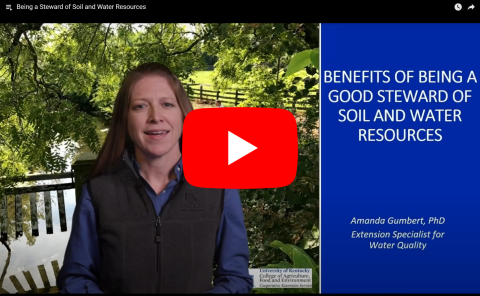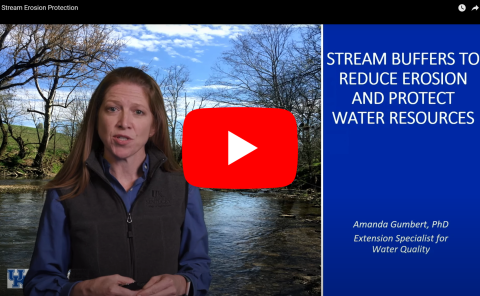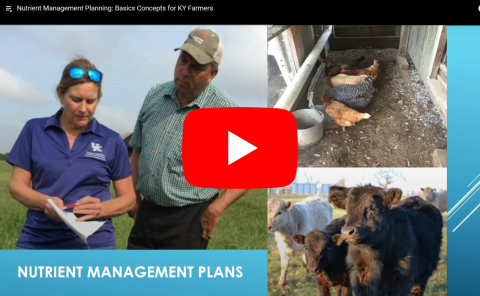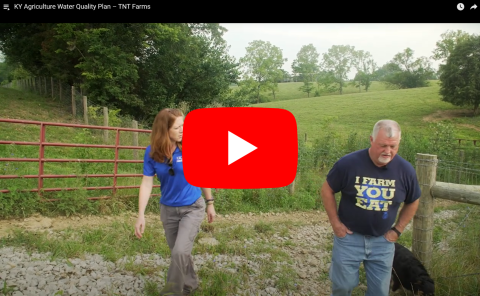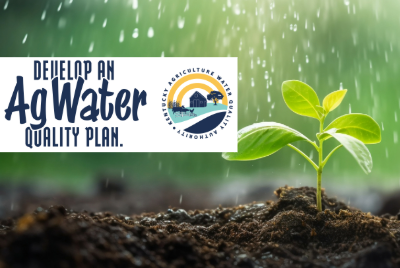Agriculture Water Quality Planning
Kentucky Agriculture Water Quality Act
The Kentucky Agriculture Water Quality Act (KAWQA) protects surface and groundwater resources from pollution from agriculture and silviculture activities. The Act affects all landowners with 10 or more contiguous acres who conduct agriculture and silviculture operations on their land. Kentucky farmers can show their commitment to stewardship by developing and implementing a Kentucky Agriculture Water Quality Plan.
Resources on this site can help farmers assess their operation and identify best management practices to include in their Kentucky Agriculture Water Quality Plan. Assistance to implement the plan can be obtained by contacting your local Conservation District Office or your local Cooperative Extension Service Office.
If you have questions regarding the Kentucky Agriculture Water Quality Plan please contact:
Amanda Gumbert, Extension Specialist for Water Quality at the University of Kentucky
Send email to: amanda.gumbert@uky.edu

KAWQA Fact Sheet
What is the KY Agricultural Water Quality Act and how does it help protect surface and groundwater?
Read Fact Sheet
Info Brochure
Learn more about the Kentucky Agriculture Water Quality Act in this information brochure.
Info Brochure

Related Publications
Peruse publications related to the KY Ag Water Quality Act in our collection of water and soil related publications.
Find PubsFREQUENTLY ASKED QUESTIONS
The Kentucky General Assembly passed the Kentucky Agriculture Water Quality Act in 1994. The goal of the act is to protect surface and groundwater resources from pollution as a result of agriculture and silviculture (forestry) activities.
The Agriculture Water Quality Act requires all landowner/land users with ten (10) or more acres that is being used for agriculture or silviculture operations to develop and implement a water quality plan based upon guidance from the Kentucky Agriculture Water Quality Plan.
"Agriculture operation" means any farm operation on a tract of land, including all income producing improvements and farm dwellings, together with other farm buildings and structures incident to the operation and maintenance of the farm, situated on ten (10) contiguous acres or more of land used for the production of livestock, livestock products, poultry, poultry products, milk, milk products, or silviculture products or for the growing of crops such as, but not limited to, tobacco, corn, soybeans, small grains, fruits and vegetables, or devoted to and meeting the requirements and qualifications for payments to agriculture programs under an agreement with the state or federal government. "Silviculture" generally means that part of forestry that involves growing and harvesting of trees.
The Kentucky Agriculture Water Quality Plan consists of best management practices from six different areas - Silviculture, Pesticides and Fertilizers, Farmstead, Crops, Livestock, and Streams and Other Waters. Each BMP includes definitions and descriptions, regulatory requirements, Agriculture Water Quality Authority requirements, design information, practice maintenance, technical assistance, cost share assistance, recommendations and references. This statewide plan will serve as a guide to individual landowners/land users as they develop water quality plans for their individual operations.
The KY Agriculture Water Quality Act officially became law in October, 2001. This means that individual landowners/land users with 10+ acres involved in agriculture or forestry (silviculture) should have developed a water quality plan and implemented best management practices on their farms to protect water quality. Various tools are available to help landowners develop or update their plan. An online tool or printable form can be used to identify best management practices and develop an individual plan. After identifying the best management practices, landowners/land users should implement these practices on their land. Assistance for developing and implementing a water quality plan can be found at local Conservation District or Cooperative Extension Service offices.
Contact:
Dr. Amanda Gumbert
Extension Water Quality Specialist
University of Kentucky
Email: amanda.gumbert@uky.edu
